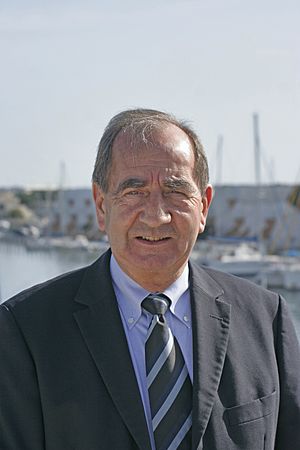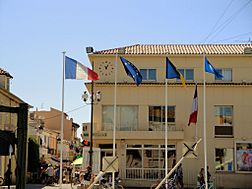Étienne Mourrut facts for kids
Quick facts for kids
Étienne Mourrut
|
|
|---|---|

Étienne Mourrut in Port-Camargue.
|
|
| Mayor of Le Grau-du-Roi | |
| In office 13 March 1983 – 4 April 2014 |
|
| Preceded by | Jean Bastide |
| Succeeded by | Robert Crauste |
| Member of the National Assembly | |
| In office 19 June 2002 – 17 June 2012 |
|
| Preceded by | Alain Fabre-Pujol |
| Succeeded by | Gilbert Collard |
| Constituency | Gard (2nd district) |
| Personal details | |
| Born | 4 December 1939 Le Grau-du-Roi, Gard, France |
| Died | 19 October 2014 (aged 74) Montpellier, France |
| Resting place | Le Grau-du-Roi Boucanet Cimetery |
| Nationality | |
| Political party | Rally for the Republic (RPR) Union for a Popular Movement (UMP) |
| Other political affiliations |
Arise the Republic (DLR) |
| Spouse | Michèle Mourrut |
| Children | 2 children |
| Profession | shopkeeper |
Étienne Mourrut (born December 4, 1939 – died October 19, 2014) was a French politician. He was a member of two political parties: the RPR and the UMP.
He served as a representative for the 2nd District of the Gard in the French National Assembly from 2002 to 2012. Before that, he was the Mayor of Le Grau-du-Roi, a town in France, for many years, from 1983 to 2014.
Contents
About Étienne Mourrut
His Family Life
Étienne Mourrut came from a family of fishermen on his father's side, who lived in Le Grau-du-Roi. His mother, whose family came from Italy, was a merchant who sold many different items. He had several brothers and sisters.
Étienne Mourrut married Michèle in 1962. They had two sons, Jean-Michel and Patrice, who both became traders. He also had a stepdaughter, Pascale Mourrut, who helped him with his work in politics for a while. Later in his life, he was a grandfather to four grandchildren: Amelia, Nicolas, Marie, and Leo-Paul. He lived in the center of Le Grau-du-Roi.
His Early Life and School
When Étienne Mourrut was young, people sometimes called him "bacalao," which is a Spanish word for "cod fish." This nickname stayed with him throughout his life.
He grew up learning to respect his country and remember its history. A story about the battle of Diên Biên Phu that he read when he was 14 years old really made an impression on him. He also noticed that politicians in France at the time (during the French Fourth Republic) sometimes didn't act quickly or were involved in corruption. These experiences made him interested in the ideas of General de Gaulle, a famous French leader.
His Jobs Before Politics
Étienne Mourrut served in the French Navy from 1960 to 1962. During this time, he was part of some operations related to the Algerian War.
After his military service, he worked at a company called Salins du Midi. Here, he was in charge of maintenance. He also helped create a workers' union called FO Union at the company.
In 1972, he decided to become a merchant again. He eventually owned a shop where he sold tobacco.
His Journey into Politics
Étienne Mourrut decided to get involved in politics because he saw that his hometown, Le Grau-du-Roi, was not developing as fast as other towns nearby. In 1965, when he was 25, he became an alderman (a local council member) in the town. Even though he was at the bottom of the list of candidates, he was one of the most popular choices.
Later, he disagreed with the mayor. In 1971, he ran for election with a group that was not tied to any political party, but he lost. He then ran a local newspaper for six years. To challenge the mayor's decisions, he went to all the town council meetings and looked at their records. In 1975, he joined the Rally for the Republic (RPR) political party. He ran again in 1977 and was elected back to the town council.
In 1980, he was chosen to be the secretary for the RPR party in his local area, which was a very large area in France.
Serving as Mayor of Le Grau-du-Roi
First Years as Mayor (1983-1990)
Étienne Mourrut was first elected as mayor in 1983. After that, he was re-elected many times.
One of his first big projects was to make Rédarès Street a pedestrian-only area in 1984, meaning only people could walk there, not cars. He did this for many other streets later on. From 1984 to 1986, he oversaw improvements to the port. He also helped create new housing areas, like Lou Lantern (1985), The Magnolias (1988), and Thessaloniki (1990).
Other important projects included building a children's nursery and a new cemetery in 1988. He also helped create the Palace of Sport and Culture in 1990 and the Sea Palace with its Seaquarium (a type of aquarium) in 1989.
In 1984, he decided that the town should manage its own arenas (places for events). He was also elected to the General Council of Gard in 1985, which is another local government body. He served as a regional councilor from 1986 to 1992.
In 1987, he changed the town's land use plan, which decides how different areas of the town can be used. He was re-elected as mayor in 1989.
Big Changes in the 1990s
During the 1990s, Le Grau-du-Roi continued to grow and add new facilities. A casino opened in 1993. The Waterfront Boulevard was made new and bigger, and it was renamed Marshal Boulevard in 1996.
Also in 1996, a waste-water treatment plant was built to clean dirty water. A thalassotherapy center, which uses seawater for health treatments, was set up in Port-Camargue. In 1999, the city bought a private nursing home called St. Vincent residence.
In 2002, he held a local referendum (a public vote) about whether the town should buy a building called Villa Rédarès.
See also
 In Spanish: Étienne Mourrut para niños
In Spanish: Étienne Mourrut para niños
 | Emma Amos |
 | Edward Mitchell Bannister |
 | Larry D. Alexander |
 | Ernie Barnes |


